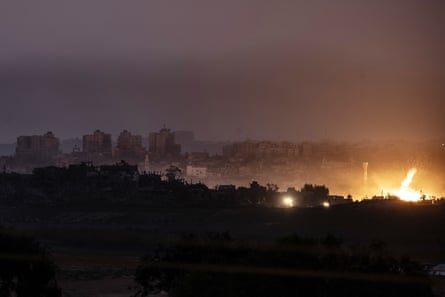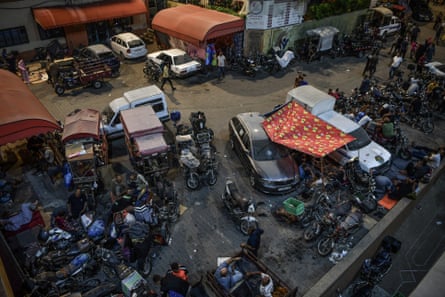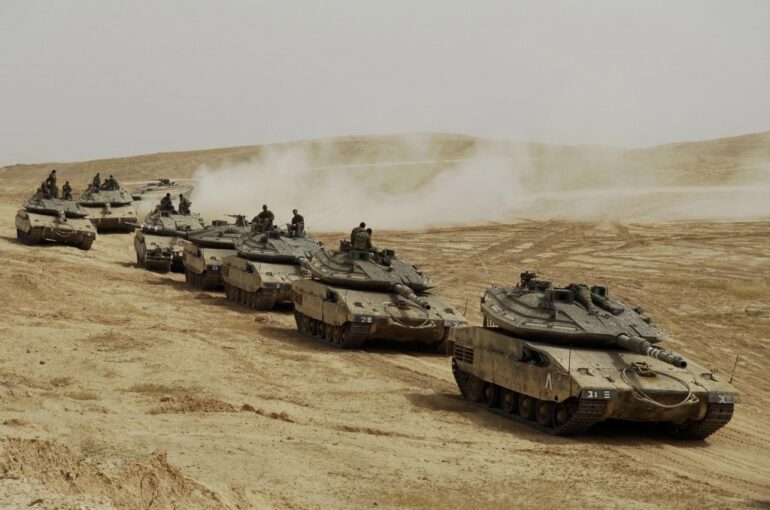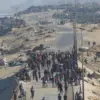Reports of fierce clashes inside Gaza as the ‘second phase’ of the Israeli military’s war against Hamas continues
Israeli troops backed by tanks have expanded their operations inside Gaza amid reports of fierce air and and artillery strikes in the enclave’s north, as nearly three dozen trucks entered through the territory’s southern border on Sunday.
Hamas confirmed it was engaged in “heavy fighting” with Israeli troops inside northern Gaza on Sunday, as besieged residents were again warned by Israel to flee southward.
Palestinian media reported early on Monday that Israeli airstrikes hit areas near Gaza City’s Shifa and Al-Quds hospitals, and Palestinian militants clashed with Israeli forces in a border area east of the city of Khan Younis, in the enclave’s south. The Guardian was not able to confirm the reports.
The reports of fighting came hours after Israel released images of battle tanks on the enclave’s western coast, signalling a potential effort to surround Gaza’s main city, two days after the Israeli government ordered expanded ground incursions across its eastern border.
Hamas said its Ezzedine al-Qassam Brigades were already “engaged in heavy fighting … with the invading occupation forces”.
Israel’s self-declared “second phase” of its three-week war against Hamas militants has largely been kept from public view, with forces moving under darkness and a telecommunications blackout cutting off Palestinians.
The phone and internet cuts appeared to ease on Sunday, but telecoms provider Paltel said that Israeli airstrikes again had knocked out internet and phone service in parts of the enclave’s northern sections, where Hamas has command centres. The outages have severely hampered rescue operations for casualties of Israeli barrages.
The reported strikes near hospitals came after the Palestinian Red Crescent said on Sunday that it had received warnings from Israeli authorities to immediately evacuate al-Quds hospital, where 14,000 people have reportedly sought shelter. Israel has accused Hamas of locating command centres and other military infrastructure in Gaza hospitals, something the group denies.

The Hamas run Gaza health ministry said the death toll among Palestinians has passed 8,000, mostly women and minors. Israel has been bombarding Gaza since Hamas gunmen stormed across the border into Israel on 7 October killing 1,400 people and taking at least 239 more hostage.
US president Joe Biden in a call with Israeli prime minister Benjamin Netanyahu on Sunday “underscored the need to immediately and significantly increase the flow of humanitarian assistance to meet the needs of civilians in Gaza,” the US said.
Israel has allowed only a trickle of aid to enter since the start of the conflict. On Sunday, 33 trucks carrying water, food and medicine entered the only border crossing from Egypt, a spokesperson at the Rafah crossing, Wael Abo Omar, told The Associated Press.
The UN world food program has said that at least 40 of its trucks needed to cross into Gaza daily just to meet growing food needs.
Israeli authorities said they would soon allow more humanitarian aid to enter Gaza, but the head of civil affairs at COGAT, the Israeli defense body responsible for Palestinian civilian affairs, provided no details on how much aid would be available.
The Israeli military has stopped short of calling its gradually expanding ground operations inside Gaza an all-out invasion. Casualties on both sides are expected to rise sharply as Israeli forces and Palestinian militants battle in dense residential areas.

The violence has inflicted serious damage and put Gaza’s crowded hospitals under growing pressure. Residents living near Shifa hospital, the territory’s largest, said Israeli airstrikes on Saturday night hit near the complex where tens of thousands of civilians were sheltering.
The Palestinian Red Crescent rescue service said nearby Israeli airstrikes damaged parts of another Gaza city hospital after it received two calls from Israeli authorities on Sunday ordering it to evacuate. Some windows were blown out, and rooms were covered in debris. The rescue service said airstrikes have hit as close as 50 meters from the Al-Quds Hospital where 14,000 people are sheltering.
Israel ordered the hospital to evacuate more than a week ago, but it and other medical facilities have refused, saying evacuation would mean death for patients on ventilators.
“Under no circumstances, hospitals should be bombed,” the director general of the International Committee of the Red Cross, Robert Mardini, told CBS news.
Concerns that the violence could spread across the region have continued, after Israel said it struck three militant cells that fired from Lebanon into Israel on Sunday. Hamas said its forces in Lebanon fired 16 missiles at the Israeli city of Nahariya. Hezbollah, a Hamas ally, said it also fired missiles at several sites.
The Israeli military also said early Monday that its aircraft hit military infrastructure in Syria after rockets from there fell in open Israeli territory.
Reuters, Agence France-Presse and the Associated Press contributed to this report


